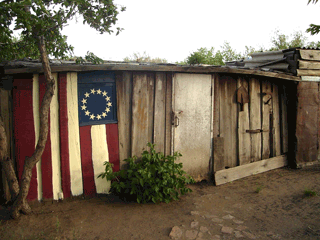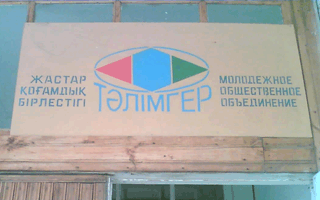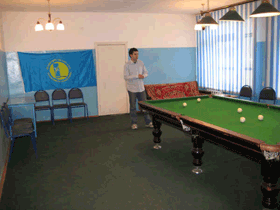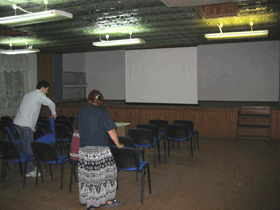
Explaining the motivation to leave one’s homeland, comfort zones, and, ultimately, established identity can be a difficult task. When the proposed destination is considerably less comfortable than one’s accustomed conditions, explaining becomes even more difficult. Catch phrases like “life changes,” “new adventures,” and “fresh perspectives” can only shed so much light on your intentions – even if your audience wants to understand.
When I decided to leave New York City, I had been working for two years as a legal consultant at a law firm. As each day seemed to meld into the next with little variation, I felt a need to revamp my lifestyle and further develop myself personally and professionally. So, I gave up my apartment, quit my job and joined a Washington DC based development agency, which offered to send me to the Central Asian nation of Kazakhstan.

At that moment, I knew almost nothing about Kazakhstan, its culture, or the Russian language, which is one of that country’s official languages and the language in which I would be working. Yet, I wasn’t very nervous. How different could another country really be? I had little understanding of what I was getting into or the type of change I was about to bring upon myself.
I was based at an agro-technical college in a rural village. Even when the initial culture shock of eating horse meat (it’s a Kazakh national dish), having no running water, and drinking ten cups of tea per day slowly wore off and these things became my new norm, I was still often surprised by less-obvious details of everyday life in Kazakh culture and society.
The most profound cultural differences became apparent during my first significant work project. The youth organization where I was stationed had been awarded a small grant from USAID, a development contractor, to build a youth center where the regional youth could socialize in a drug-and-alcohol-free environment. From when our organization was notified that we won the grant to when we actually received the funds – interest in our organization soared.
The three principle members of the youth group and I began to receive invitations to regional NGO conferences, to meetings with local politicians to discuss youth matters, and even for television appearances. We derived much confidence from this attention until we realized that we were slowly losing control of our own project. Although the grant was modest, to an underdeveloped community it represented a major influx of funds and soon many were dreaming of how it might serve their own self-interests. So many people were offering their input that the focus of our project was blurring.
This problem reached its pinnacle when one of the regional akims (a high-level administrative post in Kazakhstan) decided that our youth center should include a gun range (it was alleged that her son had recently taken up the sport). Our little project had become a big production.

In any environment, development work tends to be very precarious, especially at the grass-roots level. There is always a chance funds will be mismanaged or promises will be broken. Fortunately, the primary source of our funding was USAID, which had strictly stipulated how the money was to be allocated. Such concrete provisions frustrated some of our would-be collaborators. As quickly as they tried to join our project, they abandoned our work. Even the gun range idea was postponed when it became clear that outside funding would be needed to realize it.
It was discouraging that our golden idea had become a thought of the past. No one seemed to care anymore. However, this proved to be a blessing in disguise as we now could refocus on the original goals and direct the project accordingly. In the meantime, we needed to find a contractor who could help us with the remodeling and this would be another source of culture shock for me.
There was a small budget for the contractor but the vital extra sets of hands needed to assist that contractor and actually get the work done would have to be free. My organization tried to motivate the students of the technical college by demonstrating the practicality of gaining remodeling experience to their future professions, as well as value of having access to its final result – a movie theatre, a discotheque and a billiard hall.
However, it seems that the idea of volunteerism did not exist in the village prior to my arrival. Working on a project that they would not be paid for or fully own was a foreign concept of which they were skeptical. Many felt that building something for social use was a task only for the government to take on, not private citizens. Most of my potential labor force went the way of the gun range.
Another unforeseen obstacle was what I saw as a resistance to change by local shopkeepers. The youth center represented not only an opportunity for the youth to socialize but also could give the local shops an additional platform to sell their products. Our disco was planned to be opened two evenings a week and the movie theatre would show films three days a week. We approached three shops about setting up a snack counter, which is an essential element of most modern movie theatres. We even offered to have students help them set and tear down the counter each day. All they needed to do was provide the goods and a cashier and any profits would be theirs. Nobody was interested.
We persisted through these challenges and eventually convinced a contractor and a volunteer crew of three students to take on the project. If the culture shock I experienced was largely negative in the planning stages of this project, it was largely positive in its execution. I was often pleasantly surprised by how innovative and resourceful my Kazakh coworkers were. A broken tool never stayed broken for very long. They always knew some trick to fix it without having to buy anything.


They had an uncanny ability to fix and reuse old supplies whether it was nails, a 2×4, paintbrushes, or even an electrical device. The beginning stages of the renovation required using some lightweight electric tools, such as drills, saws, and a nail gun. Supplying these tools with electricity was a task because the outlets in the building had one gauge of outlet while our imported electrical tools required another. The adapter was thus important as the tool itself. Therefore, when our only adapter broke during the second day, I feared delays as even the smallest equipment failure can take a week to replace. To my pleasant surprise, one student was able to disassemble the adapter, strip the wax from the severed wires, reattach them, and thus repair the adapter. The delay was less than ten minutes and we didn’t have to buy anything! It was clear that for these students the idea of buying a replacement just because the old item was not working at full capacity did not exist.
These same principals of ingenuity are widely applied to most other aspects of daily life in Kazakhstan. What the west considers a “green lifestyle” a Kazakh villager would consider normal. Water consumption is low, electricity is conserved, compost piles and garden plots are in every yard, plastic bags are reused until they break, old jars are saved for canning, and coal stove ash is used to patch roads and driveways.
After four months and with surprisingly limited delays, our crew was putting on the final touches. With the video projector purchased, the walls painted, the sound system fully operational, and the felt on the billiard table glued down, we were ready to start planning a grand opening celebration. Some of our former partners came to the party to congratulate us while others stayed home. The local shop owners never came around. Most importantly, however, the youth came and last I heard they were still coming regularly to the new center we built.
At first, it was easy to focus on the lack of comfort or slow pace of village life. Initially the village lifestyle in rural Kazakhstan did appear very backward and antiquated. I even heard city-dwelling Kazakhs refer to it as “life without civilization.” On the surface, those observations appear to be accurate. However, there is also much that can be learned from this simpler, more resourceful culture. Even more can be learned from the process of submerging yourself in a new culture – including what you are actually capable of, what new challenges you can overcome, and what fresh perspectives you can uncover.
While I didn’t fully understand at first what I was getting myself into by setting off to rural Kazakhstan, it did turn out to be what I was seeking – a life change that left me better off personally and professionally.





